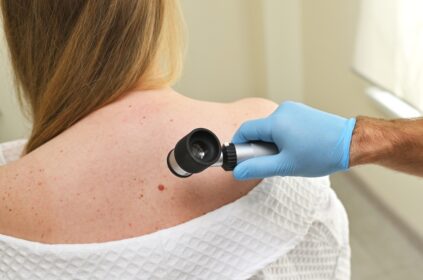A major challenge faced by people with squamous cell carcinoma (SCC) is that even though it has been cured, there is still a risk of developing more lesions in other areas of the body. Prevention, therefore, becomes a critical part of an individual’s care.
As reported in World Pharma News, Massachusetts General Brigham’s new study illustrates how a new immunotherapy not only prevents SCC but the benefits continue for a minimum of five years after treatment.
The second most common skin cancer is squamous cell carcinoma. Study co-author Dr. Shawn Demehri of the Krantz Center for Cancer Research commented that the new mechanism differs from previous immunotherapies. This is an indication that the drugs may prevent cancer using distinct mechanisms. The therapy activates certain components of the immune system, with emphasis on CD4+T helper cells that generally are not active in traditional cancer treatments.
The team noted the potential to prevent cancer in other parts of the body.
Precancerous spots that are usually the result of sun damage, increase the risk of SCC. Yet removing the spots will not necessarily reduce the risk.
Recently researchers began using vitamin D analogs which are synthetic drugs that increase the level of vitamin D in the body. Even more recently they combined chemotherapy to eliminate the precancerous spots and prevent new cancer through activation of each patient’s immune system.
Dr. Demehri’s team’s clinical trial investigated calcipotriol, a vitamin D analog that regulates the growth and production of skin cells. The trial consisted of eighteen patients who had qualifying skin lesions. The treatment was applied to the affected areas of the face and extremities two times each day for 6 days. Patients received skin biopsies prior to treatment, a day after the regimen had been completed and again eight weeks after treatment.
Ninety-five percent of all precancerous areas of the face were eliminated by the treatment. Facial lesions were removed in seven out of ten patients and eighty-two percent of scalp lesions were cleared.
Any redness that appeared around the areas treated by the drug was resolved by the fourth week after treatment. Note that the healthy skin appeared to be unaffected.
Skin biopsies were studied. The team found high CD4+T cell activity at sites where the precancerous lesions had been removed. Over the next five years the team continued collecting skin biopsies and reported that the effects of immunotherapy persisted.
In addition, Dr. Demehri’s lab developed a mouse model. Prior to the mice being treated with the trial immunotherapy, the team proceeded to induce tumors. The result was a significant delay of tumor onset and a reduction of tumor counts suggesting CD4+ T cell activity.
Immunocompromised Patients
The trial evaluated long-term efficacy of patients with healthy immune systems. The next step for the team will be evaluating immunotherapy in individuals with immuno-compromised systems such as recipients of organ transplants.
Demehri’s team is also examining whether the mechanism would be of value in other types of cancer, for example anal, oral or breast cancer.
Dr. Demehri commented that immunology has been and continues to be transforming the cancer landscape.
Source: World Pharma News
Editor’s Note: Get Involved
Cancer doesn’t discriminate. WHATNEXT and its partners are interested in amplifying the voices of those from all identities and backgrounds. If you have a cancer journey to share, reach out here to learn more about how your voice can help spread awareness and inspire individuals from all walks of life.
Cancer Prevention SCC skin cancer Skin cancer treatment Squamous-cell carcinoma
Last modified: February 11, 2025











